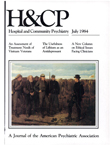The Role of Diagnosis in a Psychiatric Emergency Setting
Abstract
A sample of 253 psychiatric emergency patients consecutively evaluated in a general hospital was studied to determine the role of psychiatric diagnosis in disposition decisions and the possible influences of patient and staff variables on diagnoses. Except for patients with organic brain syndrome, age and sex were not significantly associated with diagnostic grouping; some racial differences were found. Diagnosis was strongly associated with disposition decisions: schizophrenic and manic patients were more frequently hospitalized, while patients with substance abuse disorders, adjustment and neurotic disorders, and personality disorders were more often referred to outpatient treatment. The authors stress the importance of a reliable diagnostic systern and the recruitment of diagnosis-oriented staff in improving the quality of psychiatric ernergency care.
Access content
To read the fulltext, please use one of the options below to sign in or purchase access.- Personal login
- Institutional Login
- Sign in via OpenAthens
- Register for access
-
Please login/register if you wish to pair your device and check access availability.
Not a subscriber?
PsychiatryOnline subscription options offer access to the DSM-5 library, books, journals, CME, and patient resources. This all-in-one virtual library provides psychiatrists and mental health professionals with key resources for diagnosis, treatment, research, and professional development.
Need more help? PsychiatryOnline Customer Service may be reached by emailing [email protected] or by calling 800-368-5777 (in the U.S.) or 703-907-7322 (outside the U.S.).



